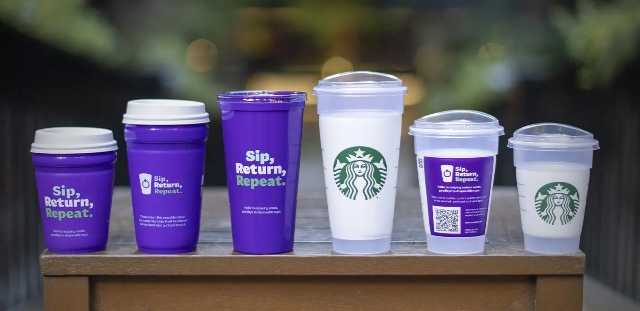PETALUMA, California – Starbucks has explored the possibility of getting more people to use reusable cups before – more than two dozen different tests around the world, many of them focusing on how Starbucks might influence customers to change their behavior when it comes to waste. But this next test will be different.
Starting in August, in Petaluma, California, the brand Starbucks is leading a city-wide collaborative reuse project to make reusable cups the default option for to-go drinks. Most reusables tests focus on customers “opting in.” The Petaluma Reusable Cup project is also unique in its extensive collaboration between public and private entities, including industry competitors, working together for the greater good, with the goal of helping shape consumer habits and cultural norms.
In addition to Starbucks, brands like The Coca-Cola Company, PepsiCo, Peet’s Coffee and Yum! Brands are participating, alongside local cafes and restaurants, city and county governments, and community and environmental advocacy groups. Starbucks licensee partners Target and Safeway are also taking part.
The project is an initiative of the NextGen Consortium, of which Starbucks is a founding member, and will be led by the Center for the Circular Economy at Closed Loop Partners. NextGen Consortium aims to reimagine how food is packaged, accelerate sustainable solutions and help reduce waste on a global scale.
For three months, eight Starbucks stores will participate in the reusable cup test, in which 30 total restaurants and cafes in Petaluma will offer customers a reusable cup for all hot and cold beverages. Customers can return their cups at one of more than 60 purple drop-off return bins located at Starbucks cafes and participating businesses throughout the city. The cups will then be professionally cleaned, sanitized and recirculated to be used again.
The test cups are branded purple. The Starbucks cup will be white in front and purple on the back, and retain the fill line markings specific to Starbucks beverage recipes. All reusable cups in the test are made from BPA-free polypropylene.
Working together
The focus is on ubiquity and convenience, said Helen Kao, director of reusables at Starbucks – making reusable cups the default option, with widespread return points and community-wide communications, aiming to support customers in building the habit of returning their cups.
“Last year, Starbucks conducted a similar test in the same area, but we tested on our own,” Kao said. “This year, we expanded on that through our partnership with NextGen Consortium to drive systems change. What if we saturated a community, and reusables became the cultural norm? Now it’s an ecosystem of global brands, local businesses, city leaders and community groups working together. The industry is realizing that it’s easier to partner than do things alone.”
The project is part of Starbucks environmental promise to give more than they take: Starbucks goal is to eventually make all customer-facing packaging reusable, recyclable or compostable.
“At Starbucks, we’re aspiring to make reusable cups the easy, everyday, sustainable choice,” Kao said. “How do we all do our part and help take small steps to make a collective impact for our communities?”
The test will measure consumer engagement when reusable cups are the default option and provide insights on how this model could work on a larger scale to reduce the number of single-use cups. NextGen Consortium estimates that across the U.S., more than 50 billion single-use cups are thrown away each year.
Petaluma was chosen as a test market because of its dense downtown layout, high walkability and overall climate in support of reuse and policies phasing out single-use packaging.
Taking initiative
Miel, a Starbucks store manager in Petaluma and 18-year partner (employee), participated in last year’s reusable cup test. Her store will participate again this year.
“I was raised in a small, rural community, and taught that using as little as possible was the best way, that caring for the land and our environment is important for all future generations,” Miel said. That mindset has led her to install solar panels at her home, drive a hybrid vehicle and sometimes even take a single sustainable cup and straw to use during trips.
She said she and her store partners learned a lot from last year’s test, and they’re optimistic about building off that experience, and reaching even more customers.
“A huge segment of the population here does align with sustainability values, but we were asking them to use new behaviors (last year), maybe do something that makes them feel uncomfortable,” Miel said. “As a society, we have to be challenged and we have to learn new behaviors, and then we have to make the choice to do that behavior every day.
“I feel like we are on the front lines doing the right work, and I’m proud to work for a company that is investing resources to make a better future, for taking the initiative on this and looking for a better way.”
To learn more about the project and see a full list of participating businesses, click here.


















